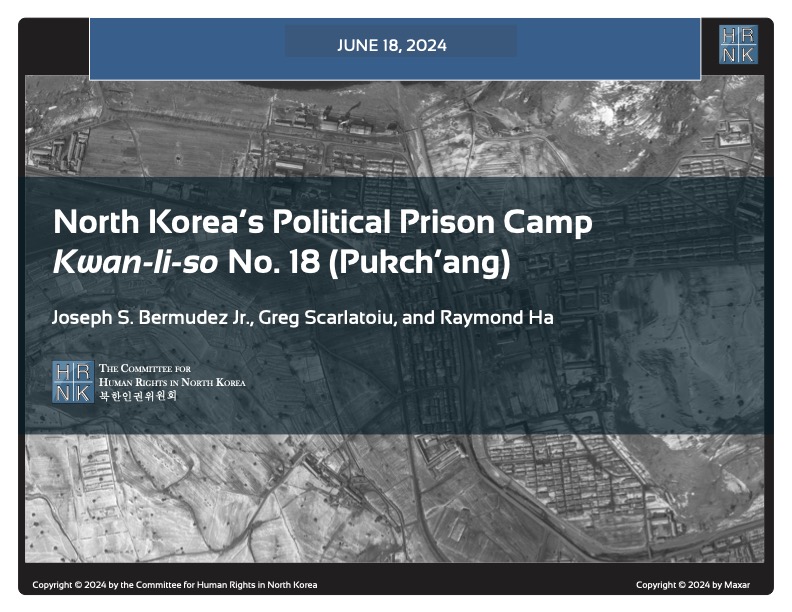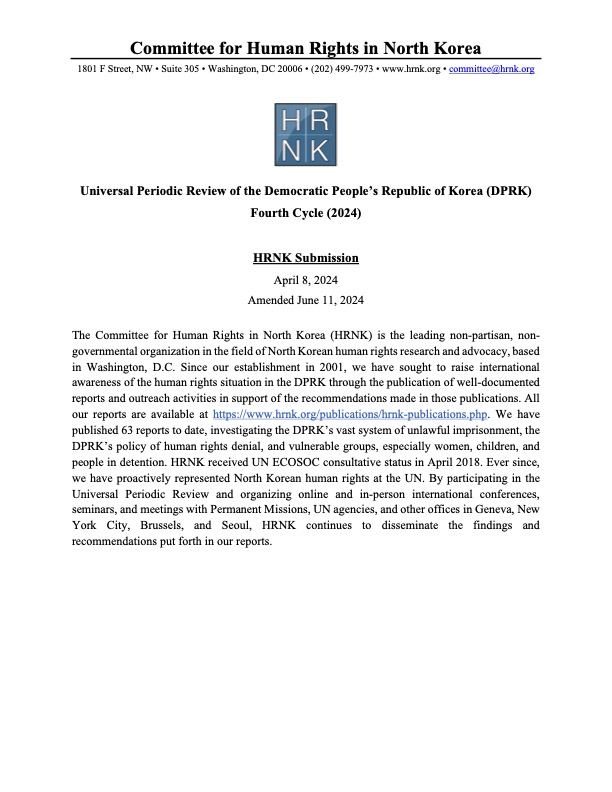French Committee to Help North Korean Population
President: Pierre Rigoulot [email protected]
Obsessed exclusively with the nuclear question, diplomats and political leaders of the civilized world apparently no longer care to address the numerous and constant human rights violations in North Korea, though North Korea has the worst human rights record since the fall of the Khmer Rouge. Human rights no longer seem to interest them, thus allowing North Korea to negotiate as if it were a respectable country that belonged in the club of civilized nations, with no one challenging them on their crimes. This is a regrettable blind spot in the world of international politics. The total absence of respect for human rights in this Kafkaesque prison state is the primary cause of the nuclear problem.
Why does North Korea need a nuclear arsenal as a sort of life insurance if not to protect its regime of terror and enslavement of the people? Why do 40% of North Koreans go hungry if it isn’t because the Kim family is obsessed with the idea of having a nuclear arsenal, no matter what the cost?
North Korea has succeeded in making itself militarily untouchable. It will no longer be deprived of its nuclear arsenal, nor of the means to produce more if necessary, after having pretended, with complete disingenuousness, to renounce it. Must we accept this and no longer challenge that regime?
There was another time when good people failed to act. A policy of non-interference was brilliantly defended by Goebbels at the League of Nations in 1933. In September 1933, Franz Bernheim, a Jew from Upper Silesia, lodged a complaint against Hitler’s odious and barbaric treatment of opponents to his regime and was detailing it to the Council of the League of Nations.
“Gentlemen,” Goebbels exclaimed, “the Third German Reich is a sovereign State and we are masters of our own home. All that has been said by this individual is not your business. We do what we deem necessary with our own socialists, our pacifists and our Jews.”
Have we become as powerless as our parents and grandparents were in 1933?
Perhaps not. In the current climate, we may have an unexpected opportunity to influence international public opinion about this regime, and help a population that has been its prisoner for the last 70 years.
In a recently published document, the NGO Human Rights Watch denounced the physical abuse women are subjected to in North Korea. According to numerous testimonies, in North Korean jails as well as at the market, women are raped and abused with total impunity. These crimes are considered normal, so much so that their victims are known to say, “We cry at night and we don’t even know why.”
For women who succeed in fleeing to China, the abuse is equally intolerable. North Korean women refugees in China are forced to go into prostitution or sold as wives to Chinese peasants. A North Korean woman is worth between 700 and 1400 euros, 2000 if she is particularly beautiful.
As the #MeToo movement gains power, it is incumbent upon women and men of conscience to expose this regime. This is why we ask feminists around the world to denounce the victimization of North Korean women. Civilized states must demand that North Korea protect women from this scourge of violence and abuse as a basic and non-negotiable precondition to acceptance in the family of nations.
This is the first satellite imagery report by HRNK on a long-term political prison commonly identified by researchers and former detainees as Kwan-li-so No. 18 (Pukch'ang). This report was concurrently published on Tearline at https://www.tearline.mil/public_page/prison-camp-18.
To understand the challenges faced by the personnel who are involved in North Korea’s nuclear program, it is crucial to understand the recruitment, education, and training processes through the lens of human rights. This report offers a starting point toward that understanding. North Korea’s scientists and engineers are forced to work on the nuclear weapons program regardless of their own interests, preferences, or aspirations. These individuals may be described as “moder
In this submission, HRNK focuses its attention on the following issues in the DPRK: The status of the system of detention facilities, where a multitude of human rights violations are ongoing. The post-COVID human security and human rights status of North Korean women, with particular attention to sexual and gender-based violence (SGBV). The issue of Japanese abductees and South Korean prisoners of war (POWs), abductees, and unjust detainees.
This report provides an abbreviated update to our previous reports on a long-term political prison commonly identified by former prisoners and researchers as Kwan-li-so No. 25 by providing details of activity observed during 2021–2023. This report was originally published on Tearline at https://www.tearline.mil/public_page/prison-camp-25.
This report explains how the Kim regime organizes and implements its policy of human rights denial using the Propaganda and Agitation Department (PAD) to preserve and strengthen its monolithic system of control. The report also provides detailed background on the history of the PAD, as well as a human terrain map that details present and past PAD leadership.

HRNK's latest satellite imagery report analyzes a 5.2 km-long switchback road, visible in commercial satellite imagery, that runs from Testing Tunnel No. 1 at North Korea's Punggye-ri nuclear test facility to the perimeter of Kwan-li-so (political prison camp) no. 16.
This report proposes a long-term, multilateral legal strategy, using existing United Nations resolutions and conventions, and U.S. statutes that are either codified or proposed in appended model legislation, to find, freeze, forfeit, and deposit the proceeds of the North Korean government's kleptocracy into international escrow. These funds would be available for limited, case-by-case disbursements to provide food and medical care for poor North Koreans, and--contingent upon Pyongyang's progress
For thirty years, U.S. North Korea policy have sacrificed human rights for the sake of addressing nuclear weapons. Both the North Korean nuclear and missile programs have thrived. Sidelining human rights to appease the North Korean regime is not the answer, but a fundamental flaw in U.S. policy. (Published by the National Institute for Public Policy)

North Korea’s forced labor enterprise and its state sponsorship of human trafficking certainly continued until the onset of the COVID pandemic. HRNK has endeavored to determine if North Korean entities responsible for exporting workers to China and Russia continued their activities under COVID as well.
George Hutchinson's The Suryong, the Soldier, and Information in the KPA is the second of three building blocks of a multi-year HRNK project to examine North Korea's information environment. Hutchinson's thoroughly researched and sourced report addresses the circulation of information within the Korean People's Army (KPA). Understanding how KPA soldiers receive their information is needed to prepare information campaigns while taking into account all possible contingenc
This report is part of a comprehensive long-term project undertaken by HRNK to use satellite imagery and former prisoner interviews to shed light on human suffering in North Korea by monitoring activity at political prison facilities throughout the nation. This is the second HRNK satellite imagery report detailing activity observed during 2015 to 2021 at a prison facility commonly identified by former prisoners and researchers as “Kwan-li-so No. 14 Kaech’ŏn” (39.646810, 126.117058) and
This report is part of a comprehensive long-term project undertaken by HRNK to use satellite imagery and former prisoner interviews to shed light on human suffering in North Korea by monitoring activity at civil and political prison facilities throughout the nation. This study details activity observed during 1968–1977 and 2002–2021 at a prison facility commonly identified by former prisoners and researchers as "Kyo-hwa-so No. 3, T'osŏng-ni" and endeavors to e
This report is part of a comprehensive long-term project undertaken by HRNK to use satellite imagery and former detainee interviews to shed light on human suffering in the Democratic People’s Republic of Korea (DPRK, more commonly known as North Korea) by monitoring activity at political prison facilities throughout the nation. This report provides an abbreviated update to our previous reports on a long-term political prison commonly identified by former prisoners and researchers as Kwan-li-so
Through satellite imagery analysis and witness testimony, HRNK has identified a previously unknown potential kyo-hwa-so long-term prison-labor facility at Sŏnhwa-dong (선화동) P’ihyŏn-gun, P’yŏngan-bukto, North Korea. While this facility appears to be operational and well maintained, further imagery analysis and witness testimony collection will be necessary in order to irrefutably confirm that Sŏnhwa-dong is a kyo-hwa-so.

"North Korea’s Long-term Prison-Labor Facility Kyo-hwa-so No. 8, Sŭngho-ri (승호리) - Update" is the latest report under a long-term project employing satellite imagery analysis and former political prisoner testimony to shed light on human suffering in North Korea's prison camps.

Human Rights in the Democratic Republic of Korea: The Role of the United Nations" is HRNK's 50th report in our 20-year history. This is even more meaningful as David Hawk's "Hidden Gulag" (2003) was the first report published by HRNK. In his latest report, Hawk details efforts by many UN member states and by the UN’s committees, projects and procedures to promote and protect human rights in the DPRK. The report highlights North Korea’s shifts in its approach
South Africa’s Apartheid and North Korea’s Songbun: Parallels in Crimes against Humanity by Robert Collins underlines similarities between two systematically, deliberately, and thoroughly discriminatory repressive systems. This project began with expert testimony Collins submitted as part of a joint investigation and documentation project scrutinizing human rights violations committed at North Korea’s short-term detention facilities, conducted by the Committee for Human Rights












